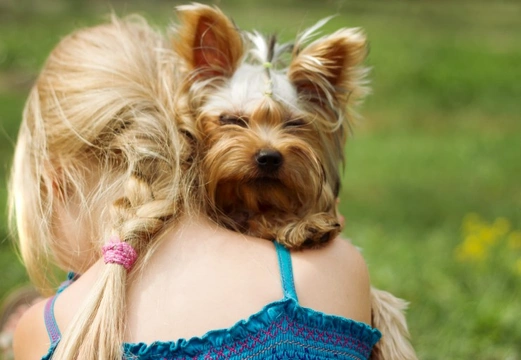
Can Owning a Dog Help Prevent Kids Developing Asthma?
Dogs bring so much into our lives, enriching them in ways that only they can do and as anyone who owns a dog knows, they are the best excuse for going out for a walk which in turn, means our canine companions keep us fitter and healthier too. Research also suggests that sharing a home with a dog could well reduce the risk of children developing asthma all thanks to their "dog dust".
So, what is dog dust?
Dog dust is now believed to contain "good dust bacteria" and it is this that's proving to be something that protects a child's respiratory system. This, in turn means they are less at risk of becoming sensitive to airborne allergens as well as certain viral infections one of which is known to be a trigger for asthma in children. It's thought that dogs actually shed a bacteria known as L. johnsonii which they leave in a household environment and if young children are exposed to this, they could well end up having enough protection against RSV to prevent them or at least reduce the chances of them developing asthma by around 13%.
If children are exposed to this dust when young, research suggests there's less chance of them developing asthma a few years further down the line. The study was carried out in Sweden and researchers now feel confident that kids aged 6 who share their homes with a canine companion are far less likely to suffer from asthma than children who have not come into contact with dogs, and the same can be said for older children and adults too!
The studies also established that children who are brought up on farms and therefore who come into to contact with farm animals during the first 12 months of their lives, were far less likely to suffer from asthma later on when they were six years old.
Although, the research did establish that when kids were less likely to suffer from asthma later on in their young lives where there is a dog in the home, just why this is so is yet to be properly established because several factors could come into play which includes a family's lifestyle. Owning a dog means being in the great outdoors more often taking a canine companion out for a walk and playing interactive games with them in the fresh air. In short, it's not only because a child is exposed to "pet dust" that may be responsible for reducing the chances of them developing asthma.
The studies also suggested that it is virtually impossible to keep a house absolutely clean when sharing it with a dog and as such kids are not kept in a "bubble". They are exposed to a little dirt which actually could prove more beneficial than living in an ultra-clean environment.
Mixed Results Over the Years
Earlier studies suggested that living with dogs and other pets actually increased the chance of a child suffering from asthma, but more recent research has now established the reverse could be true which is great news for anyone who would like to share their home with a canine companion and where they are toddlers or newborns in the home.
However, if a child already suffers from asthma, it would be a mistake to get a dog because it could make their condition even worse. The new results from these recent studies only apply to young children who do not suffer from any allergy related conditions associated with pets. However, it's important to note that although environment does play a key role in whether children and people suffer from allergies and asthma, genetics play an important part too. In short, if any family members are known to suffer from asthma or any other allergies, a child could inherit a disorder and therefore sharing a home with a dog would not be a viable option.
Conclusion
Over the years there have been mixed reports on how children could be at risk of developing asthma when they share their environment with a dog with earlier research suggesting that this would be so. However, more recent studies have established that when children live with dogs early in their lives, it actually reduces the chances of them developing asthma and other allergies by a good 15% by the time they reach the age of six which is great news for anyone who was thinking about getting a dog, but thought it a bad idea because of the risk it could present to their toddlers developing asthma.



